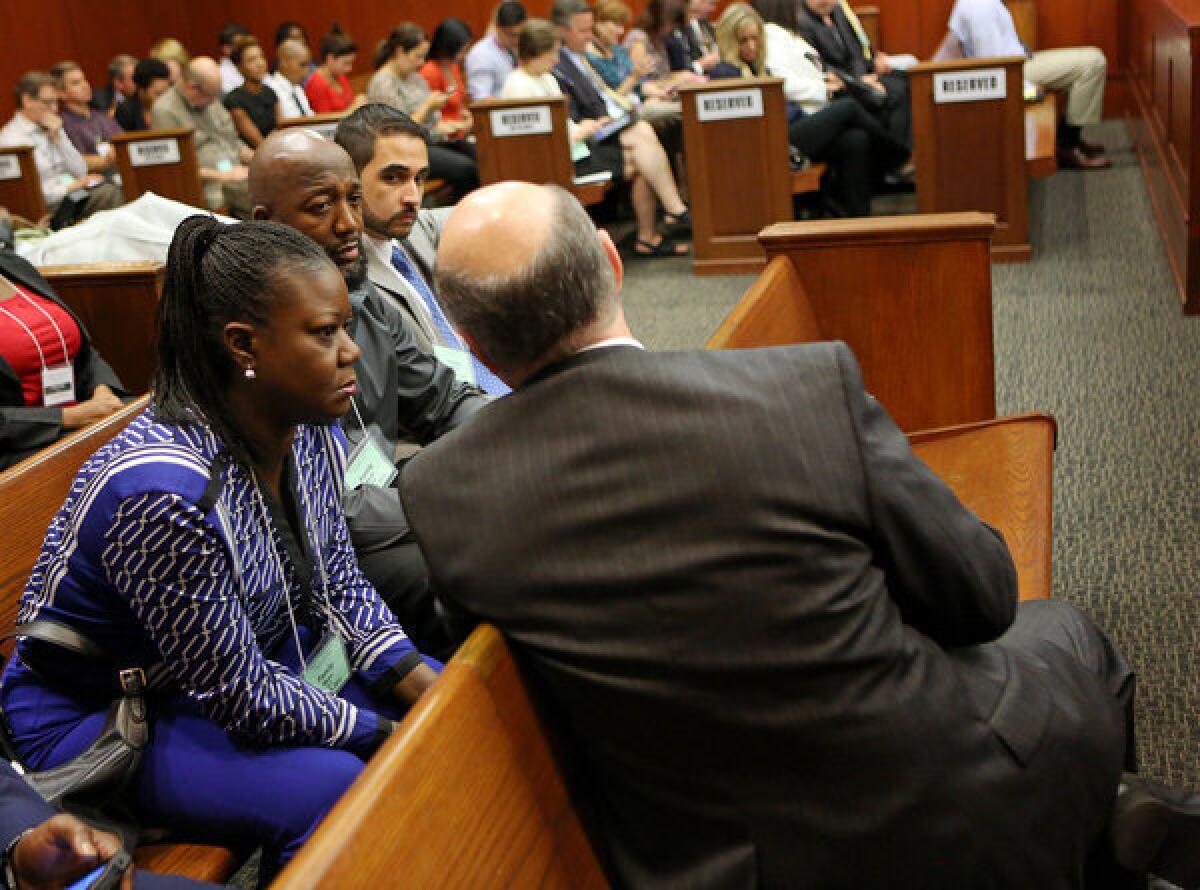Day of cross-examination expected in George Zimmerman trial

Attorneys for George Zimmerman are in the position of giving a clinic in cross-examination as the murder trial of the neighborhood watch volunteer moves into the fourth day of testimony with a key witness expected to be grilled.
For three days the prosecution has been playing offense, having a chance to set the tempo and the agenda of the trial of Zimmerman, who is facing a charge of second-degree murder in the shooting of Trayvon Martin, an unarmed African American teenager.
The defense at this stage has been trying to undermine the credibility of key witnesses or at least create some doubt in the minds of the six-person jury.
PHOTOS: The controversial case in pictures
Rachel Jeantel, the last person to talk to Martin, is scheduled to return to the stand Thursday, when the defense has promised hours more of cross-examination after Wednesday’s grueling outing that lasted more than 90 minutes.
The defense focused on two lies she had told: about her age and why she did not attend Martin’s funeral.
Jeantel shaved two years off her age, saying she was 16, in the hope that she would be given more privacy as a minor, she said. She also said she missed Martin’s funeral because she was in the hospital at the time.
Under questioning from defense attorney Don West, Jeantel gave a different version Wednesday.
“You got to understand. You’re the last person to talk to a person and he dies on the phone after you talk to him,” Jeantel said. “You got to understand … you don’t know how it felt. Did I really want to go see the body after I’d just talked to him?”
The defense wants to press Jeantel about phone calls she had with Martin as the teenager walked back to the house where he was staying in a gated community in Sanford, Fla. She said Martin said a man who was following him -- Zimmerman -- was creepy, and Jeantel urged Martin to run for safety.
GRAPHIC: Who’s who in the Trayvon Martin case
It is unknown how the six-person jury is dealing with the forceful cross-examinations. But the questioning of Jeantel was part of a pattern throughout the day.
Two of the witnesses who testified Wednesday gave gripping accounts about the night of Feb. 26, 2012, when Zimmerman, then 29, and Martin, 17, had their confrontation. The testimony by the pair -- both residents of the complex -- was important because what they described, indirectly and based on sounds, involves a confrontation in which there are no independent eyewitnesses.
Jane Surdyka told the jury that she clearly heard two yells for help that rainy night. “I truly believed, especially the second yell -- it was a yelp -- I really felt it was the boy’s voice,” Surdyka said.
After objections by the defense that were overruled, she went on to say: “It was like a boy’s voice,” adding that she then heard, “Pop, pop, pop.”
It is the smallest details that make up the heart of a tough cross-examination. Defense attorney West pressed Surdyka on inconsistencies in her testimony. For example, Surdyka said several times she heard three pops or shots, though the physical evidence shows that Zimmerman only fired once.
She also conceded that in her 911 call, she can be heard offering to open her window as she speaks to the dispatcher. In court, she testified that her window already was open when she called 911.
West also pressed Surdyka on what he called her “assumptions” that the higher voice was a boy’s. Surdyka was formerly a teacher and had worked with adolescents, West said, and should know that many young men and teens develop deep voices at an early age.
“I guess so. I don’t have children, so I don’t know,” Surdyka said as the exchange became testy.
“You’ve been around a lot of teenagers, haven’t you? Haven’t you been around some teenagers who have .... real deep resonant voices?” West said, pressing the issue over prosecution objections that the line of questioning was becoming repetitive and argumentative.
“I guess so,” she replied.
“You don’t know that for sure?” West shot back.
Another neighbor, Jeannee Manalo, testified that she was in her living room with her family when she heard howling sounds outside. She said she heard cries and looked outside and saw two people on the ground, one on top, hitting the other. Manalo said she initially didn’t have an opinion about who was on top, but after watching news coverage, she believed it was Zimmerman, whom she described as the bigger of the two.
The positions of Zimmerman and Martin are crucial because Zimmerman argues that he acted in self-defense after he was attacked by Martin. Where each person was during their confrontation goes to that claim.
Under cross-examination, defense attorney Mark O’Mara asked why Manalo had never mentioned her belief that Zimmerman was on top in previous police interviews. He made her read back a transcript of an interview in which she described only seeing shadows.
The defense lawyer also pressed Manalo on how she decided Zimmerman was on top.
Manalo said she came to the conclusion about the comparison of the sizes based on photographs of Martin, which she acknowledged could be old. One of those appeared to show him at age 11 or 12, she said, when shown the picture in court.
She added that she could be wrong about the sizes: “I don’t know who’s bigger now.”
ALSO:
Trayvon Martin friend says she told him to flee in last calls
Judge orders Ariel Castro to undergo competency evaluation
Texas filibuster captures nation’s attention all day and all night
Twitter: @tinasusman
More to Read
Sign up for Essential California
The most important California stories and recommendations in your inbox every morning.
You may occasionally receive promotional content from the Los Angeles Times.











